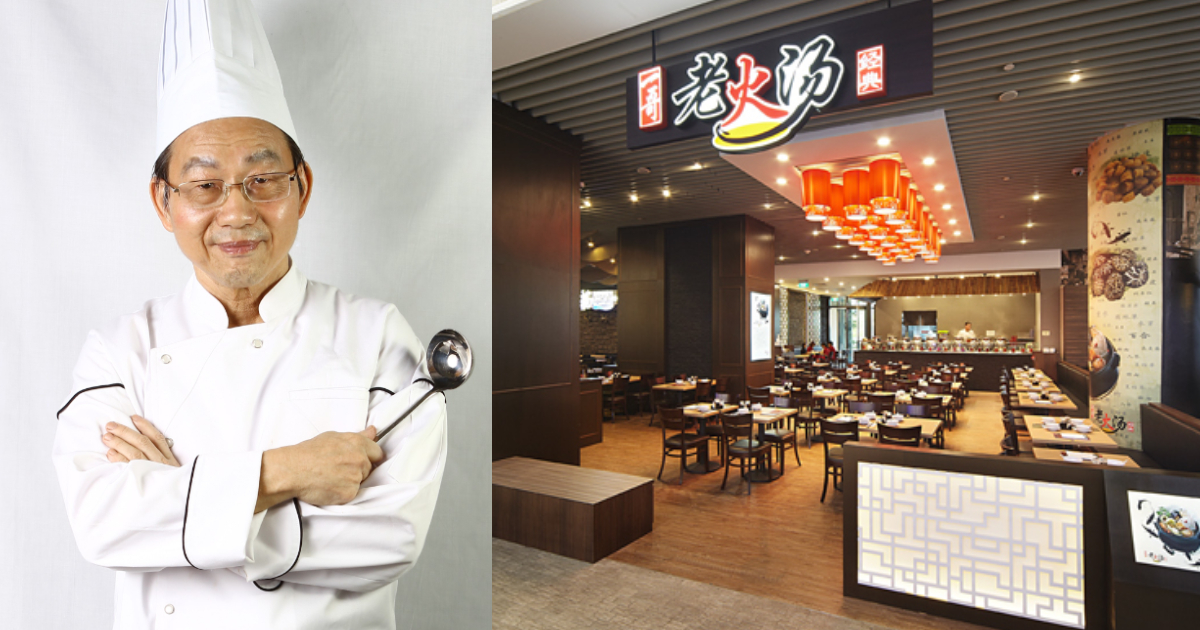The Cantonese loves soup, simply because soup conjures up a feeling of warmth and closeness.
Like all Hong Kong citizens, soup is a common feature at the dinner table for the family of Shen Xi Lao Huo Tang‘s founder, Shum Hei (Shen Xi).
Soup, especially in Hong Kong, is well-liked by the young and old for its nourishing and revitalising benefits.
Businessman and chef Shum Hei had migrated to Singapore many years ago and wanted to introduce a Hong Kong dish to the local food scene.
He embarked on a F&B business venture — selling beef tripe noodles, wanton noodles, economic rice and tofu — but it did not take off.
He then picked up his ladle again and kickstarted a soup business, specialising in nourishing Cantonese-style soups, which has since grown into a household name.
How did Shen Xi Lao Huo Tang grow from a hawker centre stall to numerous food court and restaurant outlets in Singapore today?
He Started A Chain Of “Cha Chaan Tengs” In Hong Kong
Shum Hei was no amateur to the industry as he had dabbled in F&B businesses in Hong Kong.
He owned a chain of 20 Hong Kong-style cafes (“cha chaan teng”) in Hong Kong.
In 2006, he opened a restaurant specialising in Hong Kong-style soups in Hong Kong but it closed down a year later, in the midst of the 2007/2008 Global Financial Crisis.

The Global Financial Crisis resulted in a labour crunch and it became difficult to hire foreigners. Locals rarely join their line of business, so without workers, he had to end his business.
He then traveled to Singapore in a bid to look for other opportunities. When Shum Hei migrated here, he knew nothing much about the local culture and never thought of selling soup.
I was surprised that our wonderful soup culture is non-existent in Singapore. People advised me against selling soup as Singaporeans do not seem to consume or sell soup.
So, I said to myself: “Alright, I shall not sell soup. What should I sell then?” I wanted to sell something special, to introduce a different culture — the Hong Kong culture — to the food scene here.
– Shum Hei, in a Channel 8 interview
He had originally wanted to bring into Singapore the famous beef tripe and wanton noodles from his home country. He ended up selling beef tripe noodles, wanton noodles, economic rice and tofu, but it did not take off.
The determined Shum Hei decided to made a comeback, opening a stall at a hawker centre to sell soup in 2008.
He had long set his eyes on Chinatown Food Centre when he was making his foray into the F&B industry in Singapore.
The moment I stepped into Chinatown Food Centre, I felt a sense of familiarity and warmth, particularly from the presence of Cantonese people there.
– Shum Hei, in an interview with Channel 8
It was also apparent that Chinatown Food Centre is a bustling and busy location with a crowd.
“All it takes is a phone call or a word that there will be soup on the dinner table tonight and they are unlikely to miss dinner. This is because drinking soup is a joy to them,” said Shum Hei in the televised interview.
He named his business “Shen Xi Lao Huo Tang”. “Shen Xi” means “Shum Hei” in Chinese and “Lao Huo Tang” essentially means a type of soup that is slow-boiled using natural ingredients in China and Hong Kong.

He grew his soup business from scratch and painstakingly perfected every pot of soup. It wasn’t easy in the early days because he was new to the country and had no kin here.
As a rookie stallholder, he did not know who to go for help whenever there was a blackout, a clogged drain or some minor problem. Often times, he felt helpless, but eventually reached out for help from other stallholders.
At the same time, he also became an instructor in a local culinary school, teaching students how to make soups, dim sum and roast meat. He also conducted free weekly workshops at Jalan Besar soup shop to impart the art of brewing soup.

Why would a soup expert willingly impart his skills to others?
“As a master of this generation, it is a bit selfish to keep his recipe a secret. And likewise when the next generation does the same, then a skill or a culture cannot be passed on in its entirety,” said Shum Hei.
“On a personal level, if my children do not wish to inherit my culinary skills, does it mean that I should let them be lost? Therefore, I should do my utmost best to teach as many students as possible.”
He likened his career in soup-making to a pie, to be shared with many others.
“I can bake the pies but they are meant to be shared with my students, to be offered to anyone who is interested in making soups.”
“If any of my students or friends are interested in making soup and say, ‘Mr Shum, I would like to start a soup business’, I would reply, ‘Sure. Go ahead.’ I will support their enthusiasm and teach them the ropes.”
Consistency In Every Bowl Of Soup
Operating out of the stall at Chinatown Complex Food Centre, Lao Huo Tang served affordable, traditional Chinese soups that are gentle tonics made from fresh vegetables, lean meat or pork ribs and flavoured only by natural ingredients – making the soups naturally low fat, low calorie and low sodium.
One distinguishing point about traditional Chinese soups are that oil, cream and butter are never used.

Every day, before the stall opens for business, he would be busy in the kitchen tasting every pot of soup to ensure that each pot meets the standards of consistency and flavour.
He manned the stall himself from morning to night, more than 10 hours a day.
When he needed to go to the washroom or the shops downstairs to buy something, other stallholders would help him keep a lookout on his stall.
Within three years, he expanded the business and increased his manpower to about eight employees.
The Chinatown Food Centre stall also became Shum Hei’s base to train chefs.
Venturing Into The Restaurant Business
Due to space constraint at the hawker centre, Lao Huo Tang ventured into the restaurant business in 2011, opening their first restaurant outlet at Jurong Point.

Today, Lao Huo Tang restaurants are well-known for its nourishing Cantonese-style soups and traditional home-cooked dishes.
Their signatures soups include Lotus Root Peanut Soup, Chinese Old Cucumber Soup, Traditional Pig’s Tail Soup, Buddha Jump Over The Wall, Ginseng Herbal Chicken Soup and Herbal Black Chicken Soup with Dried Scallop.
Unlike the food court stalls, the restaurants use only premium ingredients, serve larger soup portions and offer a variety of home-style dishes.
Their popular dishes include Coca-Cola Mid Joint Wing, Marmite Chicken, Home Cook Styled Sweet & Sour Pork, Pig Trotters with Vinegar, Stir Fried Har Lok Prawns and Sambal Kangkong with Cuttlefish.



Lao Huo Tang went on to open a second outlet at JEM, and another three years to open a third outlet at Waterway Point.
As we were new to the restaurant business, it took us a while to overcome challenges such as staffing, suppliers, familiarisation with mall requirements and so on, before we could open another.
– Thomas Hong, in a 2018 The Straits Times interview
There are also many Shen Xi Lao Huo Tang stalls in Singapore’s hawker centres and food courts, which sell only soup.
Shen Xi Lao Huo Tang’s food court stalls are franchises, but are owned by trusted ex-chefs who also embody the group’s overarching core values of quality, affordability, sincerity and good health.
In 2014, Shum Hei folded his F&B businesses in China and Hong Kong, with the plan to retire in Singapore for good.
He liked Singapore so much that his children even came to Singapore to pursue their studies here, declaring that “Singapore has the best education system” in the interview with Channel 8.
Subsequently, they also ventured overseas to Malaysia.
Synonymous With Affordability And Quality
They continue to serve nourishing soups at affordable prices and endeavour to bring more restaurants closer to customers.
In 2018, the brand was named an Established Brand at the Singapore Prestige Brand Award (SPBA).

Today, Master Shum Hei serves as the principal consultant for the business while Thomas Hong is the CEO of the Lao Huo Tang Group of companies.
As far as it is practically feasible, from the dishes to the restaurant interior, we endeavour to provide customers with a homely feeling when eating in any of our Shen Xi Lao Huo Tang restaurants.
– Thomas Hong, in a 2018 The Straits Times interview
The brand promise has not changed since its inception and there is always an emphasis to boil soups from scratch and prepare it fresh every morning.
Soups that are not piping hot will not be sold. There is also no MSG used in any of Shen Xi Lao Huo Tang’s soups and dishes.
According to The Straits Times article, even brand ambassadors Edmund Chen and Lynn Poh were carefully screened prior to selection.

Apparently, there is a criteria and it includes a love for drinking nutritious soup and “looking younger than their actual ages” as Thomas believes that drinking soup keeps one youthful.
Is Keeping To Tradition The Way To Success?
Shen Xi Lao Huo Tang’s success came when they pivoted to the restaurant business.
They recognised that they needed to cater to larger, communal and more intimate dining settings common in Chinese families, that a food court or hawker centre may not be able to accommodate.
They also knew that they cannot keep to just selling soup, and expanded to offering a variety of dishes. Soup was never a standalone dish in Chinese dinners.
They also keep to the old-school soup brewing method in large cauldrons and maintain the flavour and consistency through the use of natural ingredients.
They also recognise that they need to uphold the brand promise of quality and originality while modernising the dining concept.
Diners still want traditional and authentic tastes in this age of dying trades, but they are also evolving in the way they dine.
Featured Image Credit: Shen Xi Lao Huo Tang








